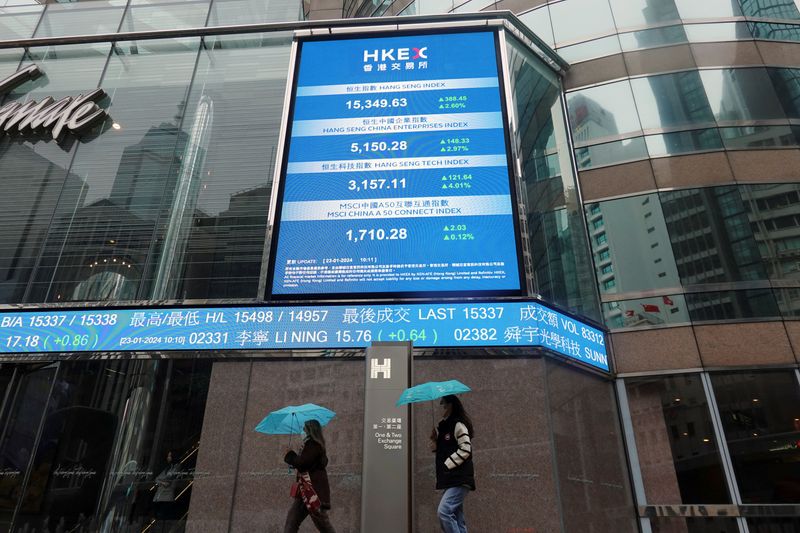By Jamie McGeever
(Reuters) - A look at the day ahead in Asian markets.
Asian markets could be in for a rocky ride on Monday, as rising U.S. bond yields, a surging dollar and a wobble on Wall Street on Friday call into question the wisdom of buying local assets.
Fed Chair Jerome Powell's comments on Thursday - that the central bank is in no rush to lower interest rates - continue to reverberate around world markets.
The 10-year U.S. Treasury yield on Friday hit 4.50% for the first time in over five months, and Wall Street fell. The Nasdaq lost more than 2% and has fallen four days in a row - the last time it did that was in April.
The MSCI World equity index has also fallen four days in a row, its longest losing streak since the first week of September, while the MSCI Asia ex-Japan index lost 4.35%, its biggest weekly decline since June, 2022.
If that wasn't enough for emerging market investors, they are having to grapple with an extraordinary rally in the U.S. dollar.
The dollar index last week leapt 1.6%, hit its highest in over a year, and recorded a seventh weekly rise in a row. It is no doubt due for a correction, but momentum is strong and it looks like it will take some bravery and conviction to stand in its way right now.
Goldman Sachs (NYSE:GS)'s emerging market financial conditions index last week spiked to a three and a half month high.
Against that potent mix of strong U.S. economic data, yields and dollar, it's no surprise emerging markets are struggling. Citing EPFR Global data, strategists at Barclays (LON:BARC) note that emerging market funds have now posted outflows five weeks in a row, with bond fund outflows particularly strong.
Asia's calendar on Monday is fairly light, with the main highlights likely to be New Zealand producer prices, Singapore non-oil trade figures, Japanese machinery orders, earnings from Mitsubishi UFJ, and GDP data from Thailand.
Economists polled by Reuters expect Thailand's growth accelerated to a 2.6% annual rate from 2.3% in the April-June period. That would be the fastest pace of growth in one-and-a-half years.
The Thai baht has been one of the better-performing Asian currencies against the dollar this year, down only 1.3% year-to-date, and markets are expecting less than 50 basis points of Bank of Thailand easing by the end of next year.
Strained U.S.-Sino relations remain in the spotlight, after China's President Xi Jinping told his U.S. counterpart Joe Biden that the issues of Taiwan, democracy, human rights and rights to development are "red lines" for China and not to be challenged.
But Xi also said China is ready to work with the new U.S. administration to "maintain communication, expand cooperation and manage differences."
Here are key developments that could provide more direction to markets on Monday:
- Thailand GDP (Q3)

- Japan machinery orders (September)
- G20 summit in Rio de Janeiro begins